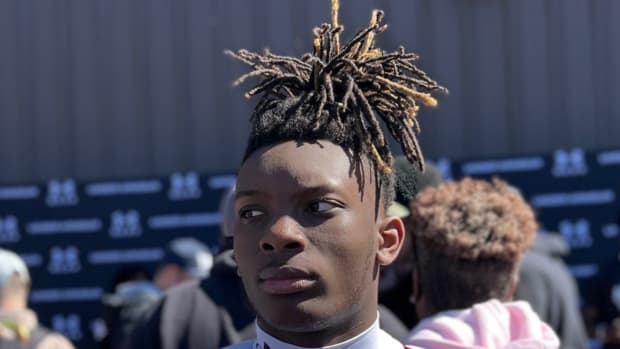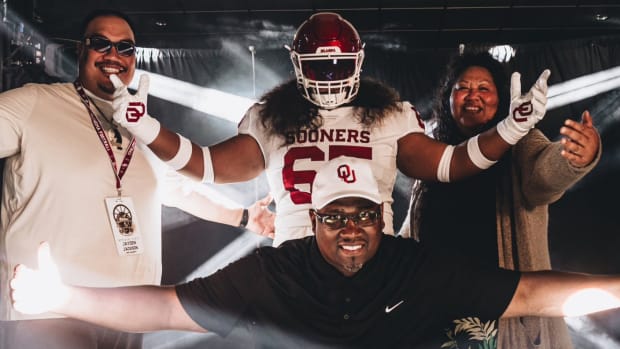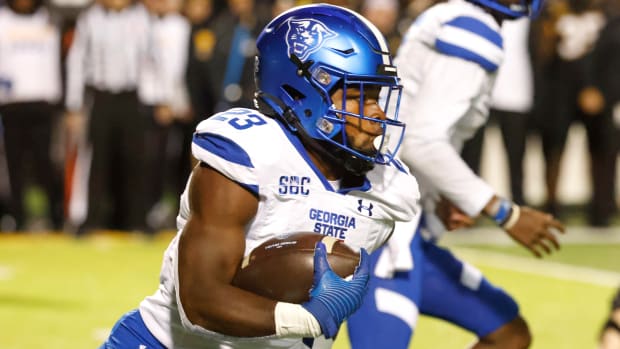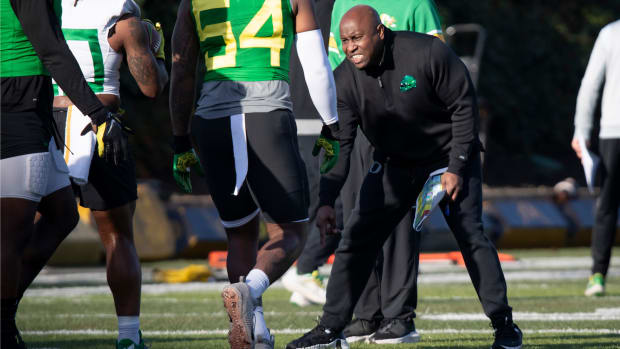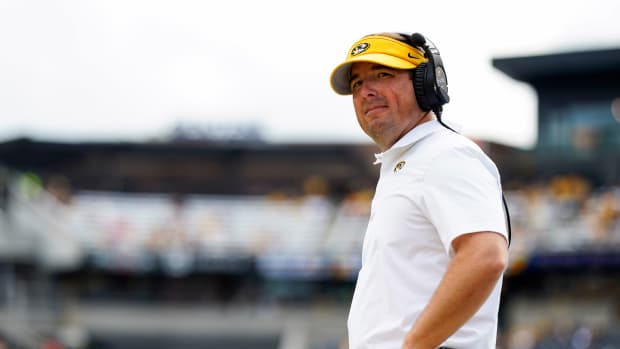Minkah Fitzpatrick's Best Isn't Good Enough for Minkah Fitzpatrick
The whole point of distressed jeans is, of course, that they are distressed. Minkah Fitzpatrick knows fashion. His mother and older sister both work for Burlington department stores; he styles teammates for awards ceremonies. And yet here he is—the best player on the nation’s best defense, a top 10 pick in next year’s NFL draft (should he decide to declare) and arguably the most dominant player who will take the field in next month’s College Football Playoff—straightening the purposely asymmetrical rip on his left knee as he explains that he abhors clutter.
The junior Alabama defensive back is meticulous in all aspects of his life, sometimes to the exhaustion of those around him. Fitzpatrick attributes the Tide’s crushing loss in last season’s championship game against Clemson to “people coming late to a meeting or just not wearing the right socks.” He acknowledges that he may sound insane but adds, “If you can’t do the small things right, how can you expect to do the big things?”
There are so many small things. The crucifix around Fitzpatrick’s neck is always centered. As he traveled the South to pick up individual honors this month—among others, he won the Chuck Bednarik Award, given to the nation’s best defensive player—he had the Alabama staff call ahead to make sure the hotel spas could accommodate treatments for his sore left hamstring. When he took photos with each trophy, he adjusted his hands so as not to cover the plaque’s face. He corrects his mother when she mixes up there and their in texts. He follows his siblings and two-year-old nephew around his dorm when they visit, straightening up whatever they knock over.
Not every little detail matters, except that of course it does. His whole life has shown him that. So he refuses to be distracted on the way to the national title he covets. Sure, Alabama won the championship his freshman year—a 45–40 victory over Clemson—but he got beaten for two touchdowns in that game, so if anything, he feels Alabama won its most recent national title despite him.
His parents worry about him, although not for the typical college-student reasons. Friends say that Fitzpatrick, 21, abstains from drugs and alcohol. His parents get his (mostly good) grades forwarded to them on Thursdays. They make the 15‑hour drive from Old Bridge, N.J., to games once a month and know his whole crew. The cleaning staff at the football facility once thanked them for raising such a nice boy. Minkah Sr. and Melissa are not concerned that their son will end up on the wrong path; they just wish that every once in a while he could take a moment to notice when he crests a hill.
“I think it’s a hard balance for athletes,” Fitzpatrick’s father says. “They are kind of programmed to do things in order, almost to the point where you don’t get the chance to enjoy the moment because you’re already worried about the next moment, and the next, and the next. So you don’t get a chance to take that second to soak it in. But he’s learning to do that slowly, I guess.”
Melissa shoots him a look. “I think he’s way wrong,” she says. “I don’t think he’s learning to do that. I actually think it’s getting worse.”
Even before they lost their house, the Fitzpatricks never had it easy. Minkah Sr. and Melissa met at an ice cream parlor after an eighth-grade dance and had two kids by the time they were 19. (Minkah Jr. and his older sister, Destiny, shared a bedroom in a tiny railroad apartment until they were six and seven. Their otherwise close friendship was occasionally interrupted by table-flipping fights usually brought on by Minkah’s neatness and Destiny’s refusal to make her bed.) “We had to grow up with them,” says Melissa.
The parents stressed that you earn your future in this world. Minkah Sr. took his son to the shop where he works 70-hour weeks as a diesel mechanic and volunteered him for the dirtiest, heaviest jobs. “If you don’t want to be here forever,” he would remind the boy, “you better keep those grades up.” Minkah was accepted to St. Peter’s Prep, an all‑boys school an hour away. The fall of 2011, his freshman year, was about to begin when Hurricane Irene crashed into New Jersey.
The seven Fitzpatricks—Minkah and Destiny have two sisters and a brother—waited the storm out, blinking into the sunlight the next day to survey the damage. Their backyard was filling with water. An otter floated past as they moved the contents of their cellar upstairs. The house was condemned, and they relocated to a shelter. They moved to Melissa’s mother’s basement in Old Bridge. Minkah Sr. dropped his son at the ShopRite on Route 9 every day, where football coach Rich Hansen would collect him and take him the rest of the way; unable to afford the cafeteria meal, Minkah ate free peanut-butter-and-jelly sandwiches for lunch.
After a year of struggling to pay tuition, Melissa buckled. “We’re going to go back to public school,” she told her son in the car after a scrimmage. It was the silence that got her attention. She saw in the rear-view mirror that Minkah had pulled his towel over his head. She stared at his scrunched-up face, lower lip jutting out, holding back tears, and thought, We’ve got to find a way to do this. Each parent picked up a third job. They didn’t find out until later that Minkah was considering quitting the team to help his dad lug engines around.
They all worked evenings to rebuild the house and spent weekends in their Honda Odyssey, journeying to football camps across the country. As a Jersey kid, they figured, Minkah needed the exposure, so his parents posted highlights on YouTube starting in eighth grade and tried not to turn down any invitations. (In one video, the pint-sized running back somersaults over a tangle of defenders.)
In the end he chose Alabama over the two dozen schools that offered him scholarships. The program had won three championships and sent 11 defensive backs to the NFL over the previous seven years, but the Fitzpatricks had assurances that academics would also be a priority. Minkah’s parents were emphatic: Their son would become the first Fitzpatrick to graduate from college. But the real fit was with coach Nick Saban. They knew that the man who had once complained that winning a national title had cost him a week of recruiting would understand their son.
Rich Hansen likes to tell the story of when the Marauders won the state championship Minkah’s senior year. Hansen called the next morning to congratulate his star. Minkah couldn’t talk. He was in the middle of a workout.
He spent spring break of his senior year standing on the sideline at Tide practice, preparing himself for the fall. He uses his Sundays to watch film with coaches. Alabama staffers trade stories of walking into a dark Mal Moore Athletic Complex after hours to find one screen ablaze, Fitzpatrick pausing and rewinding.
“He’s the standard of the program,” says junior running back Damien Harris, a top NFL prospect who credits his success this year to his offseason of working out with Fitzpatrick. Teammates refer to Fitzpatrick as “Coach Saban’s son,” because he’s the only person whose performance reliably makes the famously stone-faced coach smile.
“I just like being around him,” Saban says. “I like the way he goes about his work. It’s fun to see him improve and take on new challenges. He’s just one of those favorite guys.”
Saban likes to say, “You can either suffer the pain of discipline or the pain of disappointment,” and Fitzpatrick parrots the phrase even off the field. When the Tide won that championship game his freshman year, he called Hansen to apologize for his poor performance. He once looked so distraught on the sideline that Harris asked him what was wrong. “I missed an assignment,” he said. “Dude,” Harris said, “We’re up by 40.”
Chuck Morris, a performance coach who works with Fitzpatrick in the offseason, disputes the terminology most people use to describe his protégé’s self-flagellation. “Hard on yourself is an emotion,” he says. “He strives for excellence, which is purposeful.”
Fitzpatrick plays every position in the secondary, sometimes switching from snap to snap. He has the cover skills of a cornerback but the instincts and range of a safety. This is the future, Saban says, as the game moves toward pass-heavy, open formations. “He’s the prototype” of a modern college DB, he says.
At the end of a whirlwind week of honors, Fitzpatrick picked up the Jim Thorpe Award for best defensive back in the nation and the Bednarik Award, joining Charles Woodson and Patrick Peterson as the only players who have won both honors. Some level of meticulousness is to be expected from anyone who achieves this level of success. Still, all new Alabama players take a personality test when they arrive, so coaches can adjust to their learning styles. In the years it has been administered, no one has scored closer to Saban’s personality type than Fitzpatrick.
That sounded about right to his parents. At 12, Minkah had looked disdainfully at teammates splashing in the pool the night before the Pop Warner championship game at Disney World. He grumbled about the right way to prepare. His parents relate the story with a chuckle, but the moment still annoys Fitzpatrick. “I just think if you’re going to do something,” he says, “you should be great.”
This attitude seems more suited for a tennis player or a golfer than the star of a team sport. Even at the highest level you are likely to find yourself relying on people who do not quite match your dedication—and intensity. That reality baffled him as a child, which is perhaps why he found himself hanging out mostly with kids from his honors classes or debate club. He was popular and well liked, but he could not understand why teammates bristled when he called out poor effort. Didn’t they see that he was just trying to help?
So he led by example. Finally Hansen’s son, defensive coordinator Rich Hansen III, pulled Minkah aside. “Not everyone was raised the same way as you,” he explained. “You can’t just get mad at people. You have to teach them what the standard is and then remind them when they don’t hit it.”
Perhaps the disconnect came because other people view a victory as a victory. Fitzpatrick sets a goal, meets it and begins anew. Harris had walked by the photo of the Thorpe Award in his friend’s locker all year. So after Fitzpatrick won that and the Bednarik Award in the same night, Harris called to congratulate him. He was too late.
“Thank you,” Fitzpatrick said, “but we’re trying to get a ring.”
Every other Monday, Fitzpatrick leads a two-hour Bible study. At first his friends had to prod him to initiate conversations, reminding him that people have to connect before they can receive guidance. Fitzpatrick heard echoes of Rich Hansen III’s words recently when someone piped up to say, “You can’t expect the same things of a nonbeliever that you do of a believer because they just don’t know.” I have to teach people, he thought.
Fitzpatrick is finding his voice on the football field, too. Now, when younger players struggle during sweltering Tuscaloosa workouts, he yells, “I love it! I love it!” After an argument broke out during practice this season, he called a team meeting. “If somebody says something, they’re not trying to embarrass you,” he said. “They’re trying to make you better.”
Keke Prewitt, the unofficial minister of a group of friends that includes Fitzpatrick and Tide punter JK Scott, laughs now as he considers the 18-year-old who sat silently in the pew three years ago, mouth drawn, unsure whether people approaching him wanted a conversation or just a photo. After enough new friends told him, “You’re actually really nice,” he began to wonder: Was he intimidating? He began trying to talk to at least one stranger a day to get himself out of his shell. He was confused a few weeks ago when a TV reporter asked him how he wanted to be remembered as a football player. “As a good man,” he answered. One night he was grabbing dinner at a restaurant when a man asked if he could sit down. Fitzpatrick stopped himself before he could say no and spent the evening hearing what he had meant to the man, who was suffering from terminal cancer.
Still, once a month or so, Prewitt gets the same text from Fitzpatrick: Dude, challenge me. How can I be challenged?
“I don’t think he realizes how far he’s come,” Prewitt says.
There is still far to go. Alabama failed to win the SEC championship for the first time in Fitzpatrick’s career. A dozen players left for the NFL last year, including six defensive starters, and the group that remained suffered injuries to three key linebackers. The rematch with Clemson, which will come on New Year’s Day in the Sugar Bowl, will pit the Tide against a surging team with the only defense that rivals its own. If Alabama prevails, Oklahoma or Georgia awaits.
And that’s just the next three weeks. Soon Fitzpatrick will have to decide whether to return for his senior year or declare for the NFL draft. The choice seems easy—he would be a top pick, putting him in line for an eight-figure deal—but he maintains he has not made it. Friends say he has not even discussed the draft with them. Even his house is divided. His father, fearing injury before his son signs his first contract, would prefer he go. His mother, holding fast to the vision of a Fitzpatrick in a mortar board, believes he will never earn his degree if he leaves. “We’ll continue to argue,” she says.
“It’s not arguing,” Minkah Sr. corrects her with a grin. “It’s intense fellowship.”
But first: that ring. If Fitzpatrick gets his second in three years, if he leads Alabama to another national title, if he helps Saban tie Bear Bryant as the most decorated college football coach in history, with a sixth? Harris laughs. “If we win,” he says, “Minkah will give everybody hugs, he’ll be smiling—but as soon as he gets out of that locker room, he’ll be watching film, trying to find out what he did wrong.”
Fitzpatrick has evolved as a leader, a teammate and a man, but his parents are right. He is no better at basking in his own success. This is the price of pursuing greatness. The hill has no crest.



